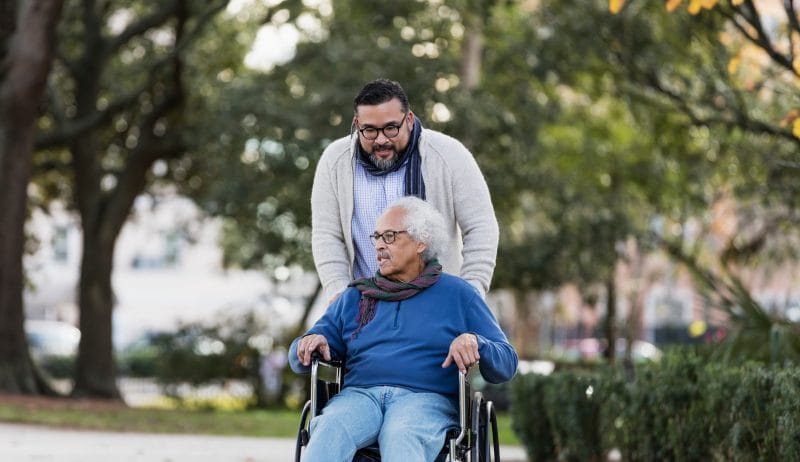When a family member becomes ill, injured, or simply finds themselves in need of a family caregiver, the dynamics between those involved change. As a first-time family caregiver, you are fulfilling a vital role in the relationship, though it will not be without challenges.
In most cases, caregivers ease into the role by driving to appointments or helping with tasks such as finances or meals. As your loved one’s needs increase, your role will change and may require greater commitment. These tips will help you find your way on the journey, whether you find yourself at the beginning or in the midst of being a compassionate caregiver for your loved one.
Talk About the Future – Now

If you have an aging family member who will eventually need you as a caregiver, the time to talk about the future is now. While it can be an uncomfortable subject to discuss, it is crucial that you know their wishes and what is important to them when the time comes. No subject should be off limits in the discussion, as it is important for all involved to have the same expectations.
Should you choose to wait—after a diagnosis or injury—options may become more limited and you or your loved one may have greater anxiety about the situation overall. You don’t have to blindly begin a discussion, but look for an opening to start the conversation. If you notice areas where your loved one is struggling or expresses concern about, you are likely to find opportunities to talk. If your loved one shuts down your first effort at a conversation, keep trying. Approach them gently, and enlist the assistance of a close friend, trusted physician, or another family member if necessary.
Health concerns should be a top priority, but finances are equally important. This can be a difficult subject for many, but most caregivers will need to review bank accounts and insurance policies to prepare for needs as they arise. Always show respect, listen to wants and needs, and honor their wishes to the extent you are able when discussing any concerning topics with your loved ones.
As previously mentioned, often inviting other close family members and dear friends into the process can help make approaching these topics easier. However, be sure your loved one never feels you are forcing the issue, and that the conversation is happening to ensure their wishes are followed.
Don’t Attempt It Alone

Being a family caregiver is challenging, even more so when you attempt to do it alone. Create a network of resources in the form of family, friends, and community. Trying to do it alone can cause burnout or even your own health issues in extreme cases. A team approach can help you consistently offer support with valuable tasks—from helping with bill paying to delivering dinner.
Even when taking the team approach, if you are the primary caregiver, everyone should recognize you as such and understand your position in maintaining plans and priorities. If conflicts or disagreements arise, call on a trusted mediator for assistance.
Plan for the Future
Once the conversation has occurred and you have the support team in place, the next step is to develop a plan for the future. Planning will include items such as delegating responsibility for each task in both the short and long term. Try to anticipate potential events and consider best case responses, but recognize you cannot prepare for every unknown. Knowing who will take the lead, and who will fill in when the primary caregiver needs a break are important planning points.
The focus should be on what is best for your loved one, giving all caregivers the opportunity to fill various tasks such as driving to medical appointments, preparing meals, bill paying, and shopping. It is important that everyone involved in your loved one’s care be comfortable with the more intimate tasks that may be required; which can include bathing, dressing, or using the restroom. Hiring assistance like a trusted home health care provider is a viable option if those in your resource network are not comfortable with such tasks.
If a number of family members are involved in caregiving, a written record of the plans made can be helpful to avoid future misunderstandings. Give everyone a copy to everyone of the support team. It will also be beneficial to plan an easy way for everyone to communicate. Email chains, social media chats, or group text messages can all keep everyone in the loop as scheduling and other changes occur.
Making Caregiving More Manageable

Your situation is unique because your loved one holds a special place in your heart and has specific needs. Even so, there are tools which can make caring for your loved one easier and more manageable. Seeking necessary information and assistance services will help provide support for you as the caregiver as well as your loved one.
Be sure your loved one’s physicians are aware of your status as primary caregiver and keep you informed regarding condition changes, treatments, and medications. Preparing your loved one’s home to ensure safety is also an important part of caregiving. It may include changes such as adding night lights, grab bars, handrails, and other adaptations depending on your loved one’s needs. Finding a way to organize all the information you need—health records, insurance information, medications, and more—will make it easily accessible when you need it.
Taking Care of the Family Caregiver

Caregivers often focus so much on the needs of their loved ones that they fail to care for themselves. Make sure you exercise, eat healthy, sleep, and enjoy your favorite activities will keep you well and healthy for your own sake as well as that of your loved one.
If you need assistance in looking after your loved one, contact Jewish Family Home Care today for the best non-medical in-home caregiving support available.
